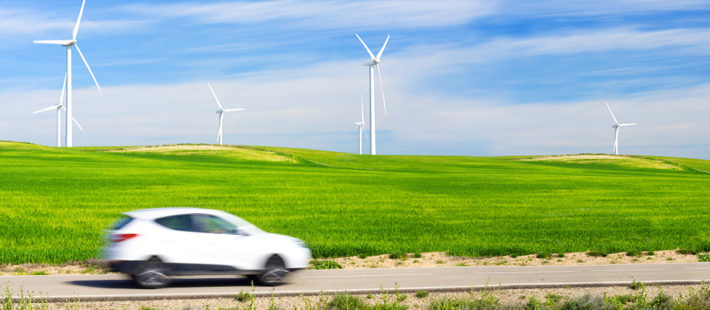Within the innovation project RACE-TP (Lightweight Recyclable Automotive thermoplastic CompositE structural parts for large series production), the consortium of companies and researchers have developed acrylic-based thermoplastic materials, called Elium, that offers economic potential that can reach the desired mechanical performances while ensuring easy recycling
Substitution of critical raw materials with thermoplastic composite for the automotive industry
The innovation project consortium has produced sixty-four parts, including during a one-hour continuous production run, and impact tests are showing the desired performance. Within three minutes time, the first robot can handle the glass fibre piece that serves as a skeleton (“preform”), to deposit it in the mould where injection of the Elium resin takes place, and to remove it for the next part coming. Based on the previous experience of IRT-M2P partner, it is believed that with the same resin chemistry, an additional gain of 30” can be won on the cycle time.
The final resin-based product was integrated to the door’s structure and that will protect passengers in case of a crash weighs 1.3 kg in comparison to the current structural part made in steel that weighs nearly 3.5 kg. The partners from RACE-TP innovation project expect now to provide car manufacturers (like Renault and PSA) soon with an affordable thermoplastic solution.
What was the main goal of the RACE-TP innovation project supported by EIT RawMaterials? The project aimed to build up a pilot plant that is nearly similar to the final industrial manufacturing conditions and to perform pilot-scale assays at the IRT-M2P facilities in order to demonstrate the possibility to manufacture resins based structural parts in real industrial conditions. The total cost of the R&D activities related to the project was of EUR 1.28 million, and EIT RawMaterials contributed by funding the pilot-scale activities.
Involvement and cooperation of education, research and business sectors (knowledge triangle integration) in delivering the success case Ghent University was modelling the properties of the composite material and the specific products. The modelling was based on a set of mechanical tests of the materials.
Environmental benefits
This new product will bring substantial environmental benefits. Indeed, these parts manufactured in thermoplastics only weight 1.3 kg instead of the corresponding part produced usually in steel that counts for 3,5 kg. For a 4-doors car, this means a reduction of weight of nearly 10 kg in total, which will contribute to less energy consumption and CO2 emissions. Furthermore, Elium is fully recyclable.
Based on the successful process, with the performance of manufacturing that is totally in line with the ones requested in this sector activity (e.g. 30 parts produced/hour), and products that fulfil the standards (e.g. resistance at crash), these new products should be shortly adopted by the automotive industry.
Elium resin properties
- 30 to 50% lighter than the same parts made from steel with the same resistance
- Perfect for complex design forms
- Seamlessly blends with glass or carbon fibres
- Compatible with conventional thermosetting resin transformation technologies (Resin Transfer Moulding, Infusion, Flex-moulding)
- Exceptional post-thermoforming (welding and glueing)
- Styrene free compared to unsaturated polyesters
- Parts easily thermoformed and recycled with a comparable mechanical performance for epoxy parts
- Cost less to manufacture compared to other thermoplastic technologies:
- Conventional thermoset resin processes
- Transformation at room temperature
- No organo-sheets.
Recycling composite parts made of Elium resin is possible
In 2017 our R&D teams were heavily involved in developing the recycling process for composite parts made from the Elium resin via depolymerization. The principle entails coarsely crushing the parts; the Elium resin is then heat-depolymerized so that it can be recovered and purified into a resin with the same properties as the virgin resin. Meanwhile, the remaining carbon or glass fibres can be reused.
Being able to recycle parts made from Elium resin is a tremendous asset, in particular for wind turbine manufacturers who currently use non-recyclable epoxy resins to manufacture the blades.
A new 25 m blade manufactured from Elium resin
Arkema has been working successfully with the Effiwind consortium to manufacture a new 25 m wind turbine blade. The infusion process used has helped validate the feasibility of producing on an industrial scale a very large blade from a thermoplastic composite.
More information : www.eitrawmaterials.eu
Source : JEC/News












